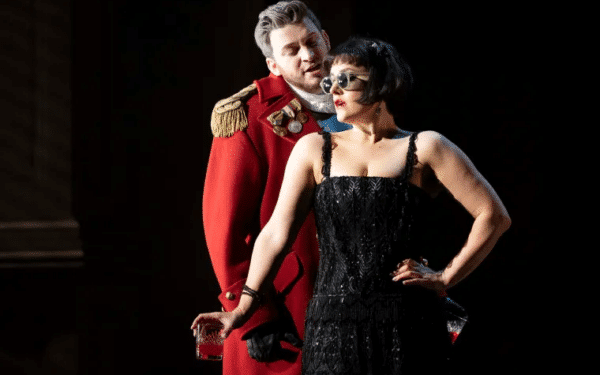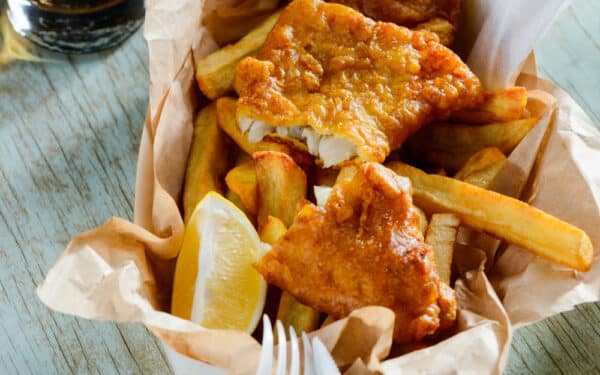Over the eleven months between June 1948 and May 1949, RAF aircraft, which in the recent war had operated out of airfields near the coast of East Anglia, had been moved to bases in the British occupation zone in Germany. This time, they had crossed the North Sea not to bomb Hitler’s Berlin but to save it from Stalin’s blockade. Meanwhile, underneath the RAF’s flightpaths in the small fishing town of Aldeburgh, the composer Benjamin Britten – a pacifist who had spent the early war years in the US – and his partner Peter Pears were getting their first festival of music and the arts off the ground.
Seventy five years later, Stalin’s successor, Vladimir Putin, is still trying to strangle independence, this time not Berlin’s but Ukraine’s. But alongside the reed beds and watery landscape of the Suffolk coast, the successors of Britten and Pears have been celebrating their own milestone, their own decades-long independence. It has been quite an improbable journey, one shadowed in its earlier years by the impact of the Cold War. This sadly has been the case this year too as a new Cold War far away to the east affects so many aspects of European cultural life including programme-making alongside the pebble beaches on the North Sea.
It is extraordinary that all those post-war years ago in an isolated part of the eastern extremities of England, a festival was conjured into existence. The wonder is that it happened at all. Of course, the quiet but determined magicians who pulled it off were Britten and Pears. The composer born in nearby Lowestoft and his singer friend from Surrey had been together since 1937. In 1947, they persuaded their local Suffolk neighbours and their wide circle of artistic contacts to give it a go. The challenges were considerable, not least finding suitable venues. This proved fortuitous as a pattern was set in which local halls and churches were used and later supplemented by the old Maltings in nearby Snape, which was converted into a concert hall in the late 1960s. With Britten as composer in residence, new productions followed year after year with him often also a performer alongside Pears. Never a parochial festival, international performers (including at the height of the Cold War the Russian cellist Rostropovich) and influences (from India via Japan to Indonesia) became staples.
From the start, the festival was refreshingly innovative, mixing song recitals with early music programmes, jazz and folk music (using several hundred local children on one occasion), as well as poetry readings, celebrity lectures (by the likes of the novelist E. M. Forster), live drama and exhibitions of paintings. Although, over time, music has come to predominate the annual summer festival – which concluded last Sunday – it has continued to offer a rich mix of contemporary arts.
The organisers have never stood still and this year was no different under the leadership of Roger Wright (who was knighted in the King’s Birthday Honours last week). Four key artists – composers and performers respectively – were deployed across the festival’s two weeks. Judith Weir (the outgoing Master of the King’s Music) was principal guest composer and new pieces of her music flowed sinuously through a number of concerts. The distinguished German cellist, Alban Gerhardt, and the inspiring young British violinist, Daniel Pioro, gave brilliant solo recitals including of Bach and Britten alongside concertos (one by the Korean Unsuk Chin, another featured composer) with the visiting London Philharmonic and BBC Scottish Symphony orchestras. The orchestras delivered grandly themselves: Mahler’s 4th and Bruckner’s massive 7th symphony (both recorded live by the BBC). New productions of works by Britten were highlights, most notably his music drama “Curlew River” (filmed in and around Blythburgh Church for broadcast on BBC4 in the Autumn).
As always, there was nothing parochial about the programme as instanced by Vox Lumines from Belgium singing Purcell’s “Fairy-Queen”, a performance of Kanze Motomasa’s Noh play and a cycle of songs by Messiaen. And no-one who attended it will forget the brio of a chamber music recital dominated by the Kanneh-Mason family last Friday evening.
The Aldeburgh Festival is thankfully still flying high 75 years on. It remains one of the glories of the British musical year. Unlike some other festivals (including Bath and Cheltenham) which reportedly have had to pull their horns in a bit for financial reasons, Aldeburgh is still offering programmes of the highest international quality but, even so, is not immune to today’s challenges. Some performers were perhaps lucky to have survived funding crises over the last twelve months: the BBC Singers faced the axe but were reprieved whilst the Britten Sinfonia lost vital support. The arts need – and get – support from public funds (notably in Aldeburgh’s case from the Arts Council England) and private ones alike but both are increasingly uncertain. The role of the BBC cannot be underestimated: without its direct support (for orchestras and young musician programmes) and indirect support via broadcast concerts, classical music in Britain would be less rich and less accessible. And support is not all one-way: Aldeburgh and the Britten Pears Foundation, as well as gaining it themselves, also disburse it in the form of music education and regional outreach to schools.
But this year has seen a disturbing new challenge to the viability of public arts events in Britain. The effect of social media-based protests against the alleged investment priorities of Edinburgh-based Baillie Gifford has led to that firm’s withdrawal from sponsorship of key literary festivals across the country. In certain cases, they were the main sponsors and their decision to stand back will limit what the organisers can afford to do and may risk the survival of some. These developments show how fragile arts funding across Britain can be. Music festivals have not – as of yet – been affected significantly by similar protest initiatives but the warning signs are there.
Write to us with your comments to be considered for publication at letters@reaction.life




